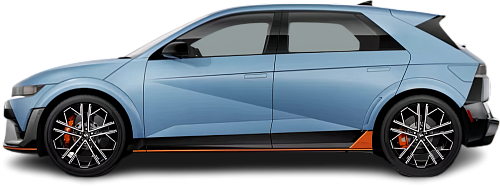Global EV Comparison: Hyundai Ioniq 5 N vs Kia EV6 GT
Struggling to Decide? Let AI Help!
Your AI Summary Is Ready!
General Info
The Hyundai Ioniq 5 N (2023-…) is currently produced, it has a starting price of €75560. The Kia EV6 GT (2022-2024) has been discontinued. You can find it for as low as €44900 on the used car market.
The two vehicles share the same body style: SUV.
| Property | Hyundai Ioniq 5 N | Kia EV6 GT |
|---|---|---|
| Years of Production | 2023-… | 2022-2024 |
| Current Status | Produced | Discontinued |
| Country of Manufacture | Indonesia, Singapore, South Korea | South Korea |
| Body Style | SUV | SUV |
| Market Availability | EU, USA | EU, USA |
| Price Europe (New) | €75560 | - Price Europe (New) |
| Price Europe (Used) | €56499 | €44900 |
| GCC Score | 6.8 | 6.8 |
Range and Efficiency
While the Hyundai Ioniq 5 N (2023-…) offers a longer real-world range and a bigger battery, it is less energy-efficient than the Kia EV6 GT (2022-2024).
| Property | Hyundai Ioniq 5 N | Kia EV6 GT |
|---|---|---|
| Range (EPA) | 356 km | 351 km |
| Range (WLTP) | 450 km | 424 km |
| Range (GCC) | 360 km | 347 km |
| Battery Capacity (Nominal) | 84 kWh | 77.4 kWh |
| Battery Capacity (Usable) | 80 kWh | 74 kWh |
| Efficiency per 100 km | 22.2 kWh/100 km | 21.3 kWh/100 km |
| Efficiency per kWh | 4.5 km/kWh | 4.69 km/kWh |
| Range and Efficiency Score | 4.9 | 5.1 |
Charging
Both vehicles feature an advanced 800-volt architecture.
The Hyundai Ioniq 5 N (2023-…) offers faster charging speeds at DC stations, reaching up to 240 kW, while the Kia EV6 GT (2022-2024) maxes out at 233 kW.
Both vehicles are equipped with the same on-board charger, supporting a maximum AC charging power of 11 kW.
| Property | Hyundai Ioniq 5 N | Kia EV6 GT |
|---|---|---|
| Max Charging Power (AC) | 11 kW | 11 kW |
| Max Charging Power (DC) | 240 kW | 233 kW |
| Architecture | 800 V | 800 V |
| Charge Port | CCS Type 2 | CCS Type 2 |
| Charging Score | 7.9 | 7.8 |
Performance
Both vehicles are all-wheel drive.
The Hyundai Ioniq 5 N (2023-…) boasts greater motor power and accelerates faster from 0 to 100 km/h.
| Property | Hyundai Ioniq 5 N | Kia EV6 GT |
|---|---|---|
| Drive Type | AWD | AWD |
| Motor Type | PMSM (front), PMSM (rear) | PMSM (front), PMSM (rear) |
| Motor Power (kW) | 478 kW | 430 kW |
| Motor Power (hp) | 641 hp | 577 hp |
| Motor Torque | 740 Nm | 740 Nm |
| 0-100 km/h | 3.4 s | 3.5 s |
| Top Speed | 260 km/h | 260 km/h |
| Performance Score | 7.2 | 7 |
Dimensions
The Hyundai Ioniq 5 N (2023-…) is wider and taller, but about the same length as the Kia EV6 GT (2022-2024).
The Hyundai Ioniq 5 N (2023-…) boasts a more extended wheelbase.
| Property | Hyundai Ioniq 5 N | Kia EV6 GT |
|---|---|---|
| Length | 4715 mm | 4695 mm |
| Width (with Mirrors) | 2152 mm | - Width (with Mirrors) |
| Width (w/o Mirrors) | 1940 mm | 1880 mm |
| Height | 1585 mm | 1545 mm |
| Wheelbase | 3000 mm | 2900 mm |
Cargo and Towing
While the trunks are the same size in both cars, the Hyundai Ioniq 5 N (2023-…) provides more cargo room when the rear seats are folded.
A frunk (front trunk) is available in the Kia EV6 GT (2022-2024), but the Hyundai Ioniq 5 N (2023-…) doesn’t have one.
The Kia EV6 GT (2022-2024) has a towing capacity of up to 1800 kg, whereas the Hyundai Ioniq 5 N (2023-…) is not officially rated for towing in the EU.
| Property | Hyundai Ioniq 5 N | Kia EV6 GT |
|---|---|---|
| Number of Seats | 5 | 5 |
| Curb Weight | 2275 kg | 2125 kg |
| Cargo Volume (Trunk) | 480 l | 480 l |
| Cargo Volume (Max) | 1540 l | 1260 l |
| Cargo Volume (Frunk) | - Cargo Volume (Frunk) | 20 l |
| Towing Capacity | - Towing Capacity | 1800 kg |
| Cargo and Towing Score | 6.3 | 6.5 |




